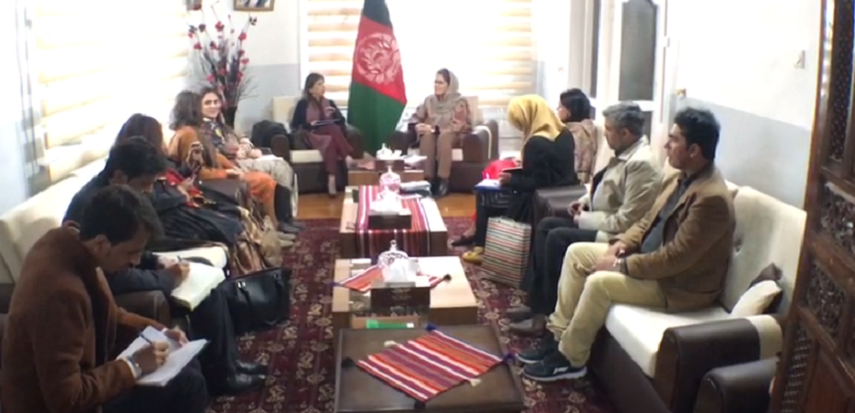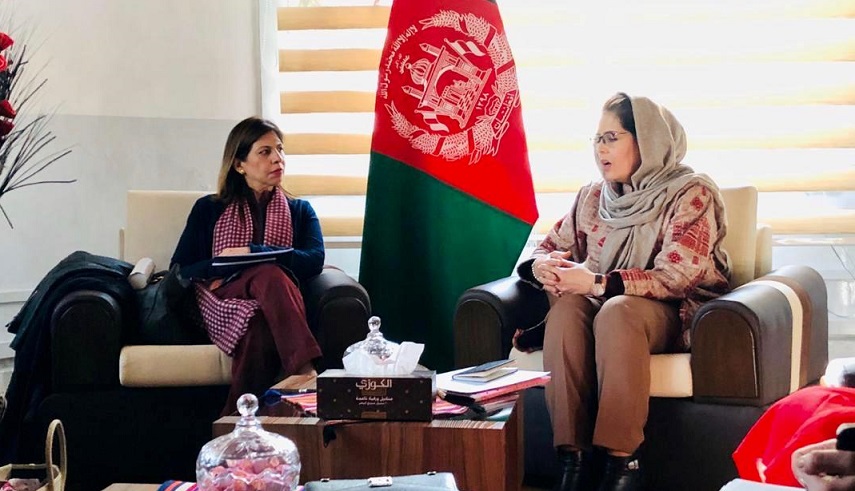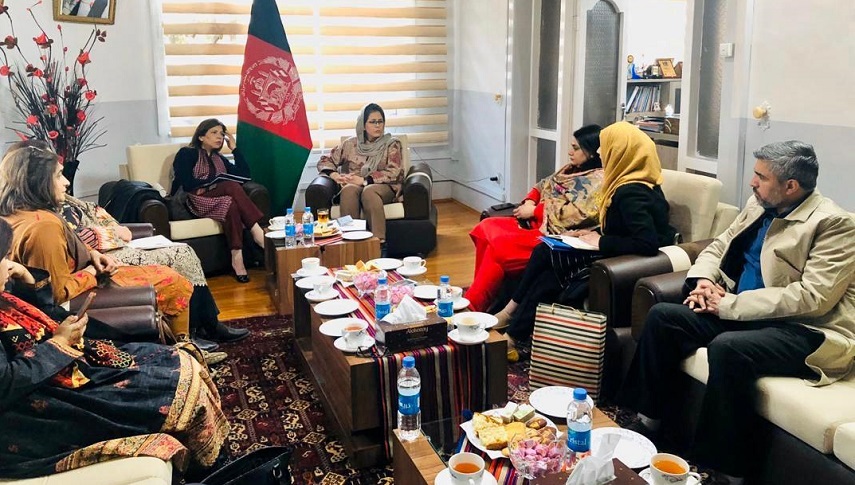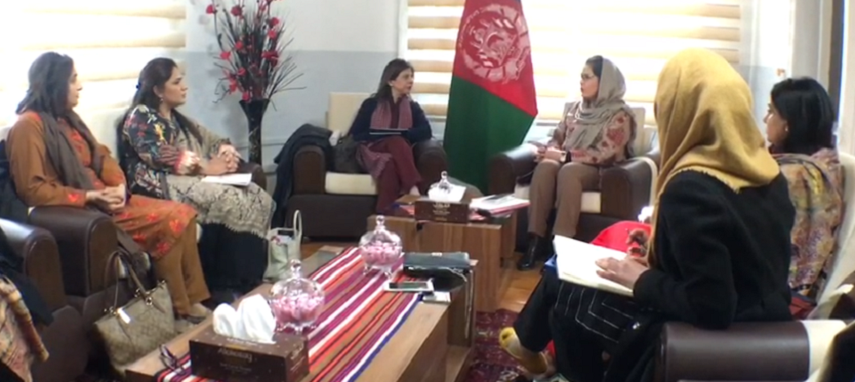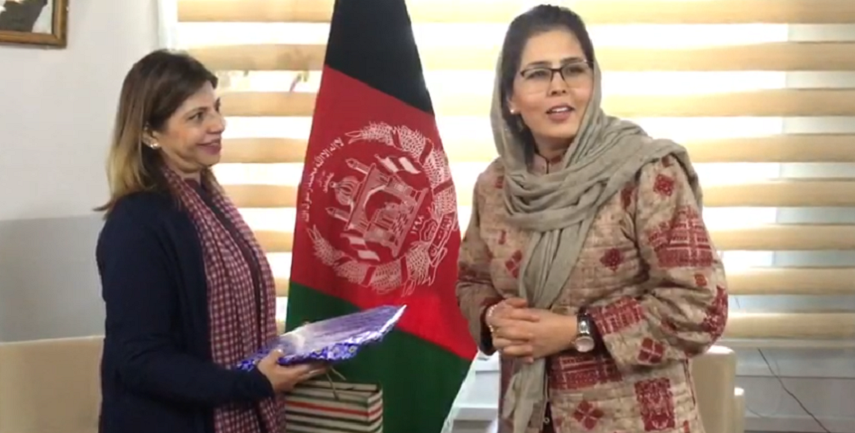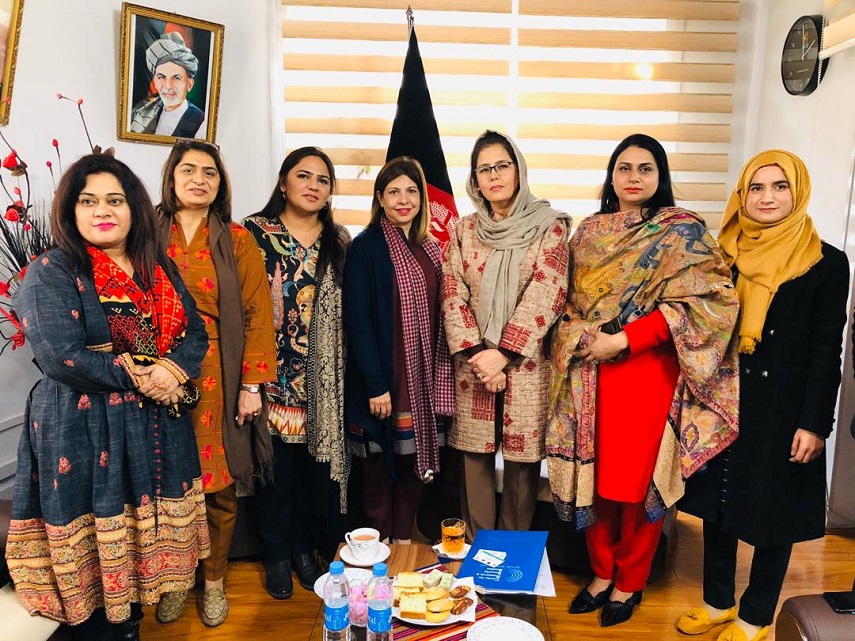On day one, December 28, 2019, the women-led delegation met with the Deputy Minister for Administration and Finance at the Ministry of Women Affairs, Ms. Nabila Musleh, in Kabul.
The two sides briefed each other on women-related issues faced in both countries, the steps taken by the civil society and the government to address them, and mechanisms where women leaders from both countries can collaborate to contribute towards peace, development, trade, attainment of women rights and ensuring girls’ education in both countries.
Ms. Nabilah Musleh stated that in her four years at the Ministry, it was the first time that she had seen a group of women leaders from Pakistan. She stated that while she is aware of the political tensions between the two countries, women have the soft power to change the issues faced by both countries. “We can focus on women rights issues, more interaction and share the lessons learned, somehow to play a good role in terms of bringing the people back together,” she said.
In response, Ambassador Tasnim Aslam, the head of Pakistan delegation, stated that she was a bit disappointed to learn that this was the first time a women-led delegation was in Kabul and hoped that this could be the beginning of frequent interactions between women leaders from both sides. She said that if women were to control the world and had the power, as they are nurturers, there would be peace and no war. She further noted: “I think we had a bad patch, but now the normalcy is returning. As long as there is absence of peace in this region, in Afghanistan, things will keep happening and unfortunately, we have to deal with them but deal with them collectively”.
Giving an overview of the Ministry of Women Affairs, Ms. Musleh stated that the Ministry was established 18 years ago and has been active in all 34 provinces in Afghanistan. The main objective of the ministry of women affairs is to assess the situation of women in Afghanistan and to solve the problems of women policy development and also coordinating women’s needs and issues with other sectors’ and ministries. One of the important focus of the ministry is to fight violence against women in Afghanistan. Regarding this, she stated, Afghanistan has also developed a law – Elimination of Violence Against Women (EVAW) – which was signed into force by President Karzai in 2009, and is in the implementation phase now. “We have lots of problems with that law and it’s not approved yet by the Parliament, but the law is being implemented. We have a high-level commission within the ministry and provincial commissions in all 34 parliaments. So, the job is to address issues related to violence faced by women in Afghanistan,” she said.
Shedding light on situation of women in Pakistan, Ambassador Tasnim Aslam stated that Pakistan, like Afghanistan, has a number of social issues related to women, such as honor killing. However, over the last decade, Pakistan has enacted many laws carrying severe penalties for violence against women. Additionally, like Afghanistan, Pakistan is a signatory of Elimination of all Forms of Discrimination Against Women (CEDAW), and also has a commission on addressing issues related to violence against women.
Regarding women participation in politics, Ambassador Aslam stated that about 20% of the parliament in Pakistan constitutes of women parliamentarians – which is a fixed quota, while on top of that, women can contest in open elections for more seats as well. In recent years, she said, more and more young educated women are coming into politics and are joining the parliament and exhibiting active participation in the legislative procedures. In fact, most of the legislation that is introduced in the parliament is either moved by women or they have very strong positions that they advocate, she further added.
Pakistani delegate and a Development Professional, Ms. Mome Saleem, inquired if there was any women caucus within the parliament of Afghanistan. Ms. Musleh stated that there is indeed a women caucus in the lower house of the parliament- Wolesi Jirga, which was previously led by Ms. Fawzia Koofi, and has been working on addressing women rights issues.
Ms. Musleh also shared that a few weeks ago, the Parliament passed a new law regarding the rights of children in Afghanistan, however, the conservative groups raised many reservations, particularly regarding the article on the age of the girl to be 18 at the time of marriage, claiming that it was not Islamic or applicable in Afghanistan. Besides this, the parliament also recently passed an anti-harassment law against women and children. However, Ms, Nabilah stated that there are so many laws, policies and mechanisms introduced by the government but when it comes to implementation, there are hurdles. “I think this is the problem everywhere,” she noted.
Ambassador Tasnim stated that it was a problem in the developing countries. However, she stated that, with the successive coverage of the stories that are in the media and harassment cases in Pakistan, some change is coming. In fact, all the ministries in Pakistan have established a cell which addresses complaints of harassment. Ambassador Tasnim was heading one in the ministry of foreign affairs and dealt with three to four cases where punishments were given and implemented.
Pakistani delegate, Ms. Sameena Durrani, a senior development professional and currently also a member of the Provincial Commission on the status of women for Khyber Pakhtunkhwa shared that the commission has also faced similar issues in Pakistan regarding a domestic violence bill and on early marriage bill that the Provincial Government had prepared under the 18th Amendment and sent to the Islamic Ideology Council. Unfortunately, both the bills received severe backlash. She further stated that she was very impressed with Afghanistan’s record in mainstreaming women in all policies in recent years and inquired about the success of Afghanistan’s National Action Plan (NAP) on UNSCR 1325 women, peace and security.
Ms. Nabila shared that, while it was a long process taking six to eight years in the drafting of the National Action Plan, the plan was finally prepared three years ago and the first phase is being implemented. She shared that the Ministry of Foreign Affairs of Afghanistan is leading it as well as coordinating its implementation. The second phase of that plan is also being prepared and the Ministry of Women Affairs is playing the role of raising awareness, changing attitudes, running development campaigns, and advocacy programs. She further stated that it is a major umbrella policy for women’s rights in Afghanistan because it can cover everything, such as participation, protection, prevention and also recovery.
Ms. Nabila Muslih further stated that while there are such mechanisms in Afghanistan, the women do not trust these as they are mostly being led by men and harassment is an issue which has a stigma attached to in the Afghan society. “That is why I call Afghanistan a land of policies, plans and mechanisms; but where implementation is really weak,” she said. However, there has been ample work on women issues in Afghanistan because of a lot of support from international partners. In their support, one of the conditions is that women should be at the top and gender should be considered in the implementation of all projects and programs. So, a huge number of gender specific projects programs are being implemented in Afghanistan, she said.
On a question by Ambassador Tasnim regarding how it is reflected in the education and syllabus of Afghan youth, Ms. Nabila said that the Ministry of Education has developed its own policy of improving the girls’ enrollment in schools and to retain them by conducting different campaigns and awareness programs. Comparing girls education from 18 years ago in Afghanistan to the present, she stated that women’s education was a central focus of donor agencies and then by the government over the last decade. However, even nowadays 60% of the girls drop out of school at the age of 10-12 due to lack of necessary facilities, such as washrooms and sanitation. So, the Ministry of Education is taking steps towards addressing such issues. She also shared that 50% of the Afghan people are living under the poverty line, and further, due to the customs, traditions and cultural issues, girls get dropped out of schools.
Speaking about providing opportunities for the youth, Ms. Mome Saleem stated that the South Asia, and southern countries globally, have a high number of young people, especially Afghanistan having 60% of the population being youth. Similarly, Pakistan also has a huge youth bulge so there is a need to change this demographic bulge into a demographic dividend because if the energy and the skills of the youth will not be channelized, both countries would face immense loss. She then discussed the efforts made by the present government for the youth – particularly, its flagship program called ‘Kamyaab Jawan’ (meaning successful youth), which focuses on three areas; education, empowerment and employment, where engaging the youth is the larger and cross cutting theme. In that too, for women, there are small grants provided for their skill developments in every sector. Ms. Saleem inquired if Afghanistan had made any such institutional set ups for the youth.
Ms. Nabila shared that under the National Unity Government, Afghanistan witnessed many changes, particularly the expanding role of the youth in the government. Around 70 to 80% of the people in important decision-making positions were now young people, which was a good strategy of the president to give them a chance, she said. She also stated that there is a deputy position for youth affairs within the Ministry of Information and Culture, which focuses on including the youth in the government, the peace process and also to push other ministries in terms of recruiting more youth in different positions. She also shared that Afghanistan has five young woman Ambassadors, out of the total of 80, with 16 deputy Ministers who are also women and representation of women is 27% in the lower house of parliament.
Ms. Nabila also shared that there is strong civil society organizations’ support with 27 women protection centers all over Afghanistan. Only seven women protection centers are in Kabul, alone. They are established by the support of the donor agencies but controlled and monitored by the Ministry of Women Affairs – so a public-private partnership.
Pakistani entrepreneur and businesswoman Ms. Hina Mansab Khan, who is also the Vice Chair of SAARC in Pakistan, stressed on the need to improve the trade relations between Pakistan and Afghanistan by creating a special link of businesswomen from both sides. She stated this way they can be empowered as well as also contribute to improving people to people contact of the two countries. She proposed holding exhibitions in both countries as well as jointly creating handicrafts and finished goods. Ms. Nabila welcomed the idea and stated that there is a Women Chambers of Commerce with over 800 women-controlled small medium sized enterprises registered. She said women in Afghanistan are actually looking for such opportunities and it would be a great idea to involve those women who are active in businesses through such a link. Speaking of SAARC, she said that SAARC has supported a helpline, where women can call and get help related to violence and psychological support, which will be inaugurated soon.
In this regard, Ambassador Tasnim stated that the two sides should certainly look into the possibility of creating a bilateral route for women businesses in both countries where women can link up for small and medium sized businesses. She further suggested that women should also hold meetings discussing how they can contribute to peace, security, climate change, and other issues in both countries collectively.
The delegates further discussed various other issues faced by women in both countries, the mechanisms put in place to address them, their implementation so far and further avenues for collaboration for women.
Ms. Mome Saleem stated that while women issues are a challenge, they should be looked at as an opportunity for working together. She said that women are above geographical and political divides, their issues are similar all across, so they can go deeper and have a multidisciplinary exchange in different sectors. Hence, there’s an opportunity for women to learn from each other and create a sense of solidarity within the region in order to bring about peace and development. She said it is the right time to take this as an opportunity to extend that hand which can show the global world that the women can lead. Ms. Nabila added that not only can women lead but also bring peace and change the political situation.
Abassador Tasnim stated that since both are developing countries and their societies are similar, they can collaborate and work together and meet more often to learn from each other and also help each other. She then extended an invitation to Ms. Nabila, on behalf of CRSS, to come to Pakistan along with her delegation.

